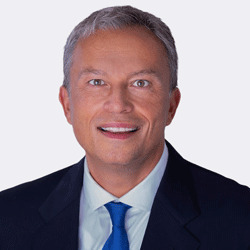
Manfred Boudreaux-Dehmer
CIO, NATO
NATO

Manfred Boudreaux-Dehmer is the inaugural CIO of the North Atlantic Treaty Organization. NATO is proud to guarantee freedom and security for one billion people in the Alliance’s 32 member nations. Manfred reports to the NATO Secretary General with the principal responsibility to realize the Allies’ vision for IT and cybersecurity.
Prior to this post, Manfred held a variety of IT leadership positions at Sierra Wireless in Vancouver, Canada, Hewlett-Packard in Houston, Texas, and Compaq Computer Corporation in Houston, Brazil, The Netherlands, and Germany. Manfred has an MBA from Duke University in North Carolina, a Master degree in Business and Management Research and a Doctorate in Business Administration from the University of Reading in the UK.
Learn more about the Benelux CIO community here.
Give us a brief overview of the path that led to your current role.
I was born in a Bavarian village close to the Alps and the border to Austria. School was interesting, but not fascinating to me, and I graduated from High School at an early age. After completing a three-year apprenticeship as an ‘Industrial Clerk’, I landed a programmer job at a company that was founded in 1648.
After struggling through IBM’s RPG programming language for four years, applied to business processes from the 17th century, I left and joined Compaq Computers in Munich. This led to a brief stint, as part of Compaq, in Gorinchem, The Netherlands, followed by a transfer to Compaq’s Latin American headquarters in Houston, Texas. Over the next nine years, I traveled extensively through South America for the company, and at one point even had an office in São Paulo, Brazil.
Compaq merged with Hewlett-Packard in 2002 and I stayed the next eight years at HP in various IT leadership positions. HP at that time was the ninth largest company on the global Forbes list, and I decided to look for something smaller. This took me to Sierra Wireless in Vancouver, a mid-size Canadian IoT technology pioneer. I ran their Global IT department for 11 years and then looked for something bigger: I found that in the CIO role at NATO in Brussels.
I decided to make up for my previous ‘youthful approach’ to academia by earning, in the past ten years, two Master degrees and a Doctorate. My thesis for the latter deals with social-technical dynamics and the avoidance of unintended consequences that result from human-machine interactions. This is very applicable now in my professional life and if you want to fill an hour or two, just ask me a question about that subject.
What are your guiding leadership principles?
Leaders should be servants. Different hierarchy levels mean different types of jobs and different compensation – nothing else. If you want change, live it. Don’t let ‘perfect’ become the ‘enemy of good.’ Jump in, and get up earlier if you have to.
With disruption being a key theme of the past few years, where do you see your role as a CIO going in the next 1-2 years?
NATO is at a place where many companies and organisations find themselves: Thinking intensely about Digital Transformation, continually enhancing cybersecurity, applying Artificial Intelligence smartly and responsibly, and finding better ways to make sense of massive amounts of data.
Thinking more broadly, NATO is a federation of fairly independent entities. My personal challenge is to tease-out win/win situations and affect change in areas where I do not have direct control. Entities that operate in a federated model, especially one that is 75+ years old, often have a systems landscape that requires modernisation, optimisation, and transformation. Improving coherence between different parts of our Enterprise is my prime focus in the next few years.
What advice would you give to someone just starting out in the role as a CIO?
It sounds cliché, but be yourself. Do things your way and do not conform. If you want to run your shop like a California start-up, do it. The ‘C’ is part of your title and you need to be comfortable with what happens around you.
You have a gift; bring it to the world – proudly and with respect for every other person’s gift.
Tell us a fun fact about yourself.
These are a few of my favourite things…
- Good music: You will find opera, rap, disco, classical, and funk in my playlists.
- A good routine: My husband and I go to a Mexican restaurant every Friday night – and have done that for the past 1100+ Fridays.
- Keeping a good journal: I have been doing that for years. It is not for ‘Dear Diary’ kind of entries to record what I saw or ate. It is mostly a forward-thinking exercise to continually analyse my present environment and envision, plan, prepare for the future. Reading back keeps me honest, and admitting to not having done something that I committed to in writing, makes me cringe and work extra hard to achieve it if it is within my control.
What is the value of joining an Evanta community?
Being the CIO can be lonely and sometimes there is a tumbleweed blowing through the C-Suite. We all need company, and so I seek the contact with like-minded peers who deal with the same strategic or tactical challenges. I look forward to exchanging ideas, talking about approaches, and getting hints from the BENELUX Evanta group.
Evanta Governing Body members share their insights and leadership perspectives to shape the agendas and topics that address the top priorities impacting business leaders today.
by CIOs, for CIOs
Join the conversation with peers in your local CIO community.